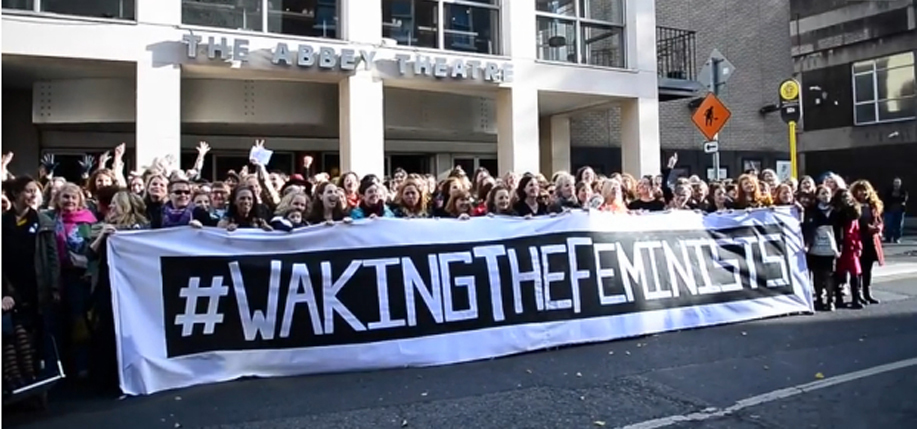Next Sunday, Fordham University in New York will host a discussion about the inequalities women face in Irish theater in conjunction with the Waking the Feminists movement, a counterpoint to the Abbey Theatre’s “Waking the Nation” program aimed at drawing attention to the lack of female voices in Irish drama.
“Waking the Nation,” a ten-play program announced last October to commemorate the 1916 Rising, came under nearly immediate criticism for its selections, which many women in theater said inadvertently highlighted a frustrating and cruel reality: in Irish theater, women are woefully underrepresented.
The Abbey’s program features seven plays from the last 100 years and three world premieres to “reflect Ireland today” and offer “fresh and provocative Irish voices [to] reflect on the legacy of the 1916 Rising,” according to the Abbey’s official press release. However, critics pointed out that only three are helmed by female directors, only one was written by a woman, and all three of these world premieres were written by male playwrights.
In response, social media outlets exploded in protest, using the hashtag #wakingthefeminists. The outcry grew vociferous enough that the board of the publicly-funded theater acknowledged that the 2016 program “does not represent gender equality” and accepted requests to hold a #wakingthefeminists debate in early November, which was attended by over 600 members of the Irish theatrical community.
“I have never been directed by a woman in 27 years. I have done one play by a woman, a French woman, that was adapted by a man. Other than that, zero,” Irish actress Donna Dent told The Irish Times at the debate.
“I have never worked with a female sound designer. I have worked with one lighting designer that was female. I have worked with one lighting technician; no sound technicians, ever. I have worked on so many productions. Once, I worked with a male stage manager – other than that, they’re all female. They’re statistics. They’re just bald facts. How much talent have we lost to chauvinism? How much talent have we lost to sexism?” she said.
Since November, the hashtag and the discussion have spread across the Atlantic, indicating that gender inequality is a similarly acute problem in American theater as well. Meryl Streep and Debra Messing are among the American thespians who have voiced their support for the movement.
But the offer of a platform for a debate and the subsequent vague commitment to “develop a comprehensive policy and detailed plan to help address gender equality” have fallen far short of satisfying the movement’s demands, Lian Bell, the Dublin-based arts manager and set designer whose frustration at the Abbey’s program birthed #wakingthefeminists, said in an open letter to the Irish Times in December, demanding the theater make a real commitment to change.
“On November 19th, I delivered a petition to the stage door of the Abbey with 5,500 signatures calling for the director and board to lead the way in establishing equality for women artists,” she wrote.
“All of us are still waiting.”
The Fordham conference will feature a scholars’ roundtable and a practitioners’ roundtable. The first portion of the program, moderated by Fordham professor Keri Walsh, features scholars whose research historicizes and illuminates the issues at stake in the movement. Author Belinda McKeon moderates the practitioners’ panel, which will consist of actors, directors, playwrights, and producers sharing their own experiences related to the inequality women face in Irish theater. The panelists will also provide updates on Irish activism and its results since the movement’s launch. ♦
_______________
“Waking the Feminists” will take place at Fordham’s Lincoln Center Campus on Sunday, February 28th, from 12:30 –4:00 and is open to the public. For more information, click here.


Great to see this movement cross the Atlantic. The women of 1916 like Constance Markievicz, Helena Maloney and Grace Gifford would be well pleased to see a new generation of female playwrights, directors, actresses and stage designers fight for the right for their voices to be heard.
The commemoration of the centenary of the 1916 Rising is sparking a feminist rebellion of it’s own.
Marita Conlon McKenna